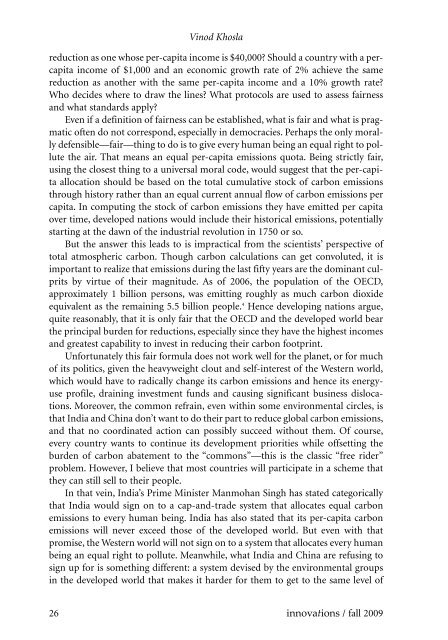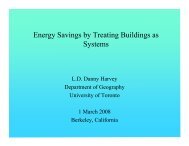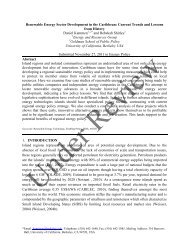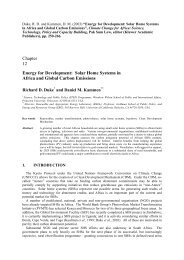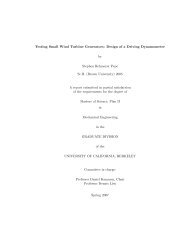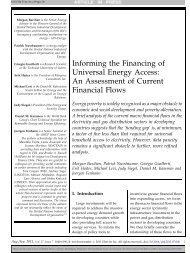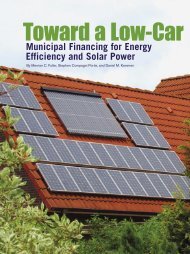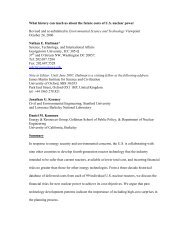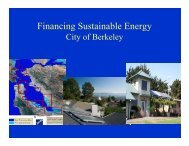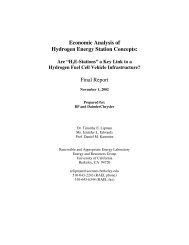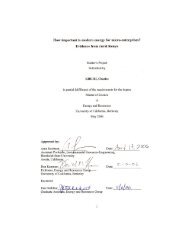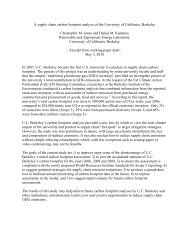Innovations, Energy for Change, Fall 2009.pdf - Renewable and ...
Innovations, Energy for Change, Fall 2009.pdf - Renewable and ...
Innovations, Energy for Change, Fall 2009.pdf - Renewable and ...
Create successful ePaper yourself
Turn your PDF publications into a flip-book with our unique Google optimized e-Paper software.
Vinod Khosla<br />
reduction as one whose per-capita income is $40,000? Should a country with a percapita<br />
income of $1,000 <strong>and</strong> an economic growth rate of 2% achieve the same<br />
reduction as another with the same per-capita income <strong>and</strong> a 10% growth rate?<br />
Who decides where to draw the lines? What protocols are used to assess fairness<br />
<strong>and</strong> what st<strong>and</strong>ards apply?<br />
Even if a definition of fairness can be established, what is fair <strong>and</strong> what is pragmatic<br />
often do not correspond, especially in democracies. Perhaps the only morally<br />
defensible—fair—thing to do is to give every human being an equal right to pollute<br />
the air. That means an equal per-capita emissions quota. Being strictly fair,<br />
using the closest thing to a universal moral code, would suggest that the per-capita<br />
allocation should be based on the total cumulative stock of carbon emissions<br />
through history rather than an equal current annual flow of carbon emissions per<br />
capita. In computing the stock of carbon emissions they have emitted per capita<br />
over time, developed nations would include their historical emissions, potentially<br />
starting at the dawn of the industrial revolution in 1750 or so.<br />
But the answer this leads to is impractical from the scientists’ perspective of<br />
total atmospheric carbon. Though carbon calculations can get convoluted, it is<br />
important to realize that emissions during the last fifty years are the dominant culprits<br />
by virtue of their magnitude. As of 2006, the population of the OECD,<br />
approximately 1 billion persons, was emitting roughly as much carbon dioxide<br />
equivalent as the remaining 5.5 billion people. 4 Hence developing nations argue,<br />
quite reasonably, that it is only fair that the OECD <strong>and</strong> the developed world bear<br />
the principal burden <strong>for</strong> reductions, especially since they have the highest incomes<br />
<strong>and</strong> greatest capability to invest in reducing their carbon footprint.<br />
Un<strong>for</strong>tunately this fair <strong>for</strong>mula does not work well <strong>for</strong> the planet, or <strong>for</strong> much<br />
of its politics, given the heavyweight clout <strong>and</strong> self-interest of the Western world,<br />
which would have to radically change its carbon emissions <strong>and</strong> hence its energyuse<br />
profile, draining investment funds <strong>and</strong> causing significant business dislocations.<br />
Moreover, the common refrain, even within some environmental circles, is<br />
that India <strong>and</strong> China don’t want to do their part to reduce global carbon emissions,<br />
<strong>and</strong> that no coordinated action can possibly succeed without them. Of course,<br />
every country wants to continue its development priorities while offsetting the<br />
burden of carbon abatement to the “commons”—this is the classic “free rider”<br />
problem. However, I believe that most countries will participate in a scheme that<br />
they can still sell to their people.<br />
In that vein, India’s Prime Minister Manmohan Singh has stated categorically<br />
that India would sign on to a cap-<strong>and</strong>-trade system that allocates equal carbon<br />
emissions to every human being. India has also stated that its per-capita carbon<br />
emissions will never exceed those of the developed world. But even with that<br />
promise, the Western world will not sign on to a system that allocates every human<br />
being an equal right to pollute. Meanwhile, what India <strong>and</strong> China are refusing to<br />
sign up <strong>for</strong> is something different: a system devised by the environmental groups<br />
in the developed world that makes it harder <strong>for</strong> them to get to the same level of<br />
26 innovations / fall 2009


